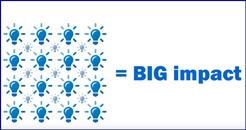 Who's job is it to build a better society?
Who's job is it to build a better society?
From a TEDx talk by Joanna Finlay
Joanna Finlay is an intrapreneur in financial services and a passionate advocate for innovation and inclusion within that sector. She has 13 years’ experience in finance, works on strategy at Virgin Money and was named national ‘Young Banker of the Year' in 2017. She spoke at Newcastle University's TEDx 2019 conference organised around the theme of ‘Build A Better Future’.
What frustrates you? Do you find yourself thinking. "If I ruled the world there wouldn't be ……….?".
I like to chat to strangers on train journeys. Interrogating my fellow passengers is a great opportunity for research and I found that most people have plenty of frustrations about the world that someone else needs to fix. But who is this someone whose job is it to build a better society? A select few with special authority? Yes, some people will have the resources and the influence to tackle some of the big problems but you and me are uniquely placed to improve our corners of the world. To turn frustrations into better futures.
If you're thinking, "What a dreamer if she thinks I have time to fix society, she needs to take a train to the real world.", please bear with me. I don't believe that good-hearted citizens should have work and family responsibilities over here and making a difference over here in the imaginary time that's left over. I believe that the answer is in how we approach our day jobs.
We need to ask what must I do to fulfil the responsibilities of my role? What is my employer paying me to do? You can then choose to ask whose frustrations can I help to fix within my role, with the skills, experience and influence that I have? Your day job is not only where you spend most of your time but probably where you're most qualified to have an impact by turning frustration into action.
if you care about the things that let people down and leave people behind, then have the courage to ask, "Do I have the skills, experience and influence to do something about this and, if not, who does? Who could I share this with?"
If we simply dismiss others' frustrations, we almost guarantee that opportunities to improve society will be missed. So next time someone's going on a rant instead of saying, "It's not worth getting bothered about it.", how about we say, "You're right, it is bad. What can we do about it?".
I work for Virgin and one of our core values is the idea that business can and should be a force for good and I believe that what's good for business is good for society and the other way round - what's good for society is good for business.
Marguerite Kerr was a teacher in the 1970s. Her students suffered from serious mental illness and Margaret's job was to keep them safe and orderly and with a basic education. Marguerite was frustrated that these children were expected to achieve so little in life. First she introduced baking lessons so that they could make bread and cakes at home with their families. Then she learnt to type and introduced classes in typing - giving her children a hope of employment.
Marguerite was my grandmother. A humble lady who was determined to make a difference in the world. She looked beyond what she was expected to do to help people in her corner of society. She used her day job to create a better future for others. She saw the students' frustrations and cared enough and had the courage to act.
Joanna then goes on to tell of other examples including her own actions for unbanked people in poverty. There are 1.5 million adults in the UK with no bank account. Extra costs from pre-pay meter accounts, pay-as-you-go mobiles, etc., create estimated extra costs of £1300 per year. This is known as the poverty premium. Imagine how frustrating that is for these individuals.
She concludes by reminding us that rather than looking for the big idea to radically improve performance you can look for lots of ways to improve it by 1% and all those seemingly small changes can add up to a big impact. What if employers encouraged colleagues to look for marginal gains in society in the roles that they're already paid to do? It's good for colleagues' motivation, it's good for business, it's good for society and it needn't be complex.
She does not think it's logical to expect someone else to fix everything - they can't because they don't see the world as you do and they don't have the skills and experience that you have. We are all uniquely placed to improve our corners of the world to turn frustrations into better futures. Kindness doesn't have a price. but the impact of your kindness could be immeasurable.
If we spend 50% of our waking hours at work, imagine how society could be transformed if we all look to fix frustrations. Using work to transform society could be rocket fuel to create a better future.
Watch Joanna's TEDx talk here:
Retweet about this article:
From a TEDx talk by Joanna Finlay, 04/09/2019